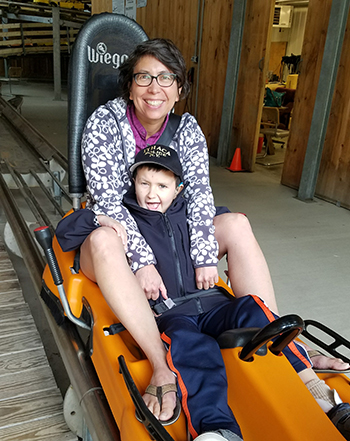Providing Support to Ependymoma Parents
Name: Colin
Type of Cancer: Anaplastic Ependymoma
Diagnosed: Age 2, 2009
By: Tamiko T. (Colin’s Mom)
— Categories:
Brain
Pediatric
 My introduction to ependymoma came when my son, Colin, had just turned two and we discovered that he had a brain tumor. Though he had certain symptoms for weeks, we didn’t understand what they were and discounted them because they never lasted for long. In the weeks and months following his diagnosis, we learned more about brain tumors in general, and ependymoma specifically, that we never wanted to learn.
My introduction to ependymoma came when my son, Colin, had just turned two and we discovered that he had a brain tumor. Though he had certain symptoms for weeks, we didn’t understand what they were and discounted them because they never lasted for long. In the weeks and months following his diagnosis, we learned more about brain tumors in general, and ependymoma specifically, that we never wanted to learn.
Fortunately, I am a researcher by trade and quickly dove into the endeavor of learning what I needed to make the best decisions possible for my son. At the time, there was a group I joined for ependymoma parents where we would share updates through email and I devoted time to studying articles that doctors gave me and finding ones on my own. By the time I met a prominent clinician and researcher from the other side of the country, he assumed that I was a pediatric oncology fellow. When I explained that I was a parent, he looked at me very kindly and said, “Don’t try to be his doctor.”
I know that he was reminding me to remain a parent, but I know that the research and reading were constructive tools, not distractions from his overall care. After all, he had a poor prognosis from the beginning and we were facing the possibility of even more dire circumstances at that time (a pre-op MRI had identified possible spinal tumors which, at his age, made his case even more complicated). We were fortunate that we carved a path for Colin to get appropriate treatment, but we wouldn’t have known that path existed if I hadn’t sought out a clinical trial that I read about that wasn’t available where we were at the time.
I constantly asked the team questions about medications that were being used, strategies for dealing with side effects, and even the rationale for the trial design. These questions came not from my desire to replace the medical team but to be an active participant and to make sure that I was meeting my responsibilities as a parent.
Pediatric Ependymoma Parents Facebook Group
In the intervening years, I have become active with the ependymoma parents that eventually grew into a global support group for parents on Facebook. As a moderator, I have created a database of trials and other information about ependymoma and help guide parents through options. That task isn’t always about identifying the “latest and greatest” but helping families understand what the standard of care options are. As it is an international group, there are people from all over the world who may not have easy access to the same treatments.
One reason I do this is because I appreciate that my education and background prepared me to become fluent in medical terms and concepts. However, most parents don’t have that good fortune, or should be expected to, in order to advocate for a good outcome for their children. Furthermore, many families have just stepped across the threshold of a cancer diagnosis and are likely overwhelmed with even the basic knowledge they need to acquire to understand what is happening with their children.
Another reason this work is important to me is that, despite five years of wonderful remission, my son’s ependymoma returned and he died a few months short of his eleventh birthday in 2018. While I can no longer advocate for him, I can help other families, regardless what stage of treatment they are in. I have a keen understanding of the difficult decisions that come once the cancer returns and as the options get whittled down. When there are no options left and families are facing the worst, I do what I can to help them through that process and get the support they need.
We were extremely lucky to have many wonderful years with our son, who lived a deeply fulfilling life. When he returned from his second round of radiation, he wanted to become a police officer and joined our local police department. They made him an officer in an incredible ceremony, but his relationship with the department and the community only grew from that point and he enjoyed nearly two years of service before he passed away.
Helping other people was one of Colin’s core beliefs. He loved community policing and spending time meeting people and sharing his good will. It was wonderful how he brought a smile to so many faces and to see how he was able to help people view their lives in a more positive light. As he was dying, we repeatedly told him that we were so proud of him and that he made a huge difference in the world.
The least I can do is to continue Colin’s legacy and help those around me to the best of my abilities. People often ask how I’m able to remain connected to the world of pediatric cancer and to see so many difficult outcomes. To some extent, it would be more difficult if I didn’t stay involved and share what I have learned. After investing so much energy into learning about ependymoma, it would not feel right to turn my back on a community that is constantly growing and is always looking for support.
